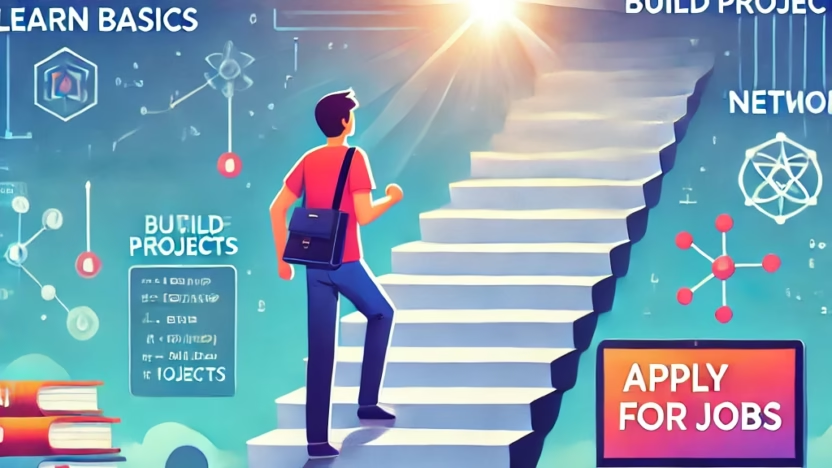Breaking into the tech industry with no prior experience might seem daunting, but it’s far from impossible. The tech world is full of opportunities for motivated individuals, regardless of their educational background or work history. With determination, strategic planning, and the right resources, you can transition into this exciting field. This guide provides actionable steps to help you start a rewarding career in tech, even without experience.
Table of Contents
- Why Choose a Career in Tech?
- Steps to Get Into Tech With No Experience
- Overcoming Common Challenges
- Staying Ahead in Tech
- Conclusion

Why Choose a Career in Tech?
The tech industry offers numerous advantages, including:
- High Demand: Companies are constantly seeking skilled professionals in fields like software development, cybersecurity, and data analysis.
- Diverse Opportunities: Roles range from coding and IT support to UX design and project management.
- Competitive Salaries: Many tech jobs offer lucrative compensation, even at entry levels.
- Flexibility: Remote work and freelance opportunities are common in tech.
- Lifelong Learning: The fast-paced nature of tech ensures ongoing growth and skill development.
Steps to Get Into Tech With No Experience
1. Choose a Tech Path
Tech is a vast field, so it’s essential to identify an area that aligns with your interests and skills. Popular tech paths include:
- Web Development: Building websites and web applications.
- Data Analysis: Analyzing and interpreting data to inform decisions.
- Cybersecurity: Protecting systems and data from cyber threats.
- UX/UI Design: Creating user-friendly digital interfaces.
- IT Support: Troubleshooting and maintaining computer systems.
2. Learn the Basics
Start with foundational knowledge to build a solid base. Here’s how:
- Free Online Resources: Platforms like Codecademy, freeCodeCamp, and Khan Academy offer beginner-friendly tutorials.
- YouTube Tutorials: Channels like Traversy Media and The Net Ninja cover various tech topics.
- Books: Read beginner guides like “Automate the Boring Stuff with Python” or “Don’t Make Me Think” for UX design.
3. Gain Practical Skills
Hands-on experience is crucial for learning and demonstrating your abilities. Focus on:
- Building Projects: Create personal projects, such as a portfolio website, data visualizations, or mock applications.
- Contributing to Open Source: Join GitHub projects to collaborate with others and learn from real-world codebases.
- Online Courses: Platforms like Udemy, Coursera, and LinkedIn Learning offer in-depth, affordable courses.
4. Leverage Certifications
Certifications can validate your skills and make your resume stand out. Consider:
- CompTIA IT Fundamentals: Ideal for IT beginners.
- Google IT Support Professional Certificate: A comprehensive entry-level certification.
- Certified ScrumMaster (CSM): For aspiring project managers.
- AWS Certified Cloud Practitioner: For those interested in cloud computing.
5. Network Actively
Networking is key to uncovering opportunities and getting your foot in the door. Start by:
- Attending Meetups and Conferences: Join events related to your chosen tech path.
- Engaging on LinkedIn: Connect with professionals, share your projects, and participate in discussions.
- Joining Online Communities: Platforms like Reddit (e.g., r/learnprogramming) and Slack groups provide valuable insights and connections.
6. Find Entry-Level Opportunities
Breaking into tech often involves starting with beginner-friendly roles. Look for:
- Internships: Many companies offer internships for individuals with little to no experience.
- Freelance Projects: Use platforms like Upwork or Fiverr to build your portfolio.
- Volunteer Work: Offer your skills to nonprofits or small businesses.
- Help Desk or Support Roles: These positions provide an excellent foundation for IT careers.
7. Tailor Your Resume and Portfolio
Your resume and portfolio are your first impression. Ensure they highlight:
- Relevant Skills: List the technical skills you’ve learned.
- Projects: Showcase your best work with descriptions of what you achieved.
- Soft Skills: Emphasize problem-solving, communication, and teamwork.
8. Prepare for Interviews
Tech interviews often include behavioral and technical components. Prepare by:
- Practicing Coding Challenges: Use platforms like LeetCode and HackerRank.
- Mock Interviews: Practice common questions with peers or mentors.
- Researching the Company: Understand their products, services, and culture.
Overcoming Common Challenges
1. Imposter Syndrome
It’s normal to feel like you don’t belong. Focus on your progress and remember that every expert was once a beginner.
2. Staying Motivated
Learning new skills takes time. Set small, achievable goals and celebrate your milestones to stay motivated.
3. Financial Constraints
Many free resources are available to help you learn without breaking the bank. Additionally, some organizations offer scholarships for tech education.
Staying Ahead in Tech
The tech industry evolves rapidly, so continuous learning is essential. Stay ahead by:
- Following Industry Trends: Subscribe to tech blogs and newsletters.
- Learning Advanced Skills: Once you’ve mastered the basics, delve into advanced topics like machine learning or DevOps.
- Networking Regularly: Build and maintain relationships with industry professionals.
Conclusion
Getting into tech with no experience requires dedication, resourcefulness, and a willingness to learn. By choosing a clear path, gaining practical skills, and leveraging networking opportunities, you can build a rewarding career in this dynamic field. Remember, every expert started somewhere—take the first step today and unlock your potential in tech.




